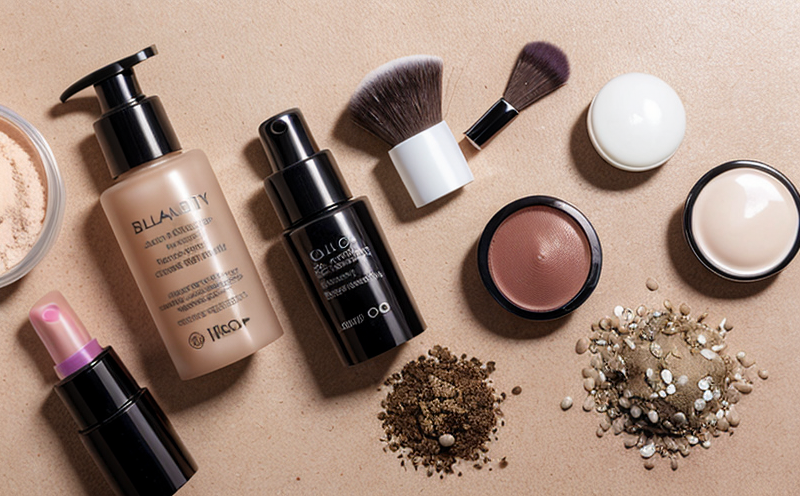Life Cycle Assessment of Cosmetic Formulations
The Life Cycle Assessment (LCA) of cosmetic formulations is a comprehensive approach that examines the environmental impacts associated with all stages of a product's life, from raw material extraction to final disposal. This service specifically focuses on assessing the environmental impact and biodegradability of cosmetic products, ensuring compliance with international standards and regulations.
The LCA process involves quantifying the inputs and outputs of resources throughout each stage of a product’s lifecycle. For cosmetics, this includes sourcing raw materials, manufacturing processes, packaging, transportation, retail distribution, consumer use, and waste management at the end of life. By conducting an LCA, manufacturers can identify areas where improvements can be made to reduce environmental impacts.
The importance of LCA in the cosmetic sector cannot be overstated. Consumers are increasingly demanding products that are not only effective but also environmentally responsible. Regulatory bodies like the European Union’s Cosmetics Regulation (EC 1223/2009) require manufacturers to provide information on the environmental impact of their products, including biodegradability.
Our LCA service uses internationally recognized standards such as ISO 14040 and ISO 14044. These guidelines ensure that our assessments are consistent with global best practices in environmental assessment. Our team of experts works closely with clients to tailor the assessment to meet specific product needs, ensuring that the results are both accurate and actionable.
When conducting an LCA for cosmetic formulations, we follow a structured approach:
- Define the scope of the study
- Determine the functional unit (FU)
- Collect data on all processes involved in the lifecycle
- Identify and quantify all inputs and outputs
- Analyze the environmental impacts using life cycle impact assessment methods
- Interpret results to provide actionable insights
The applied standards for this service include:
| Standard | Description |
|---|---|
| ISO 14040:2006 | Environmental management systems – Life cycle assessment principles and framework. |
| ISO 14044:2006 | Life cycle assessment – Requirements and guidelines for reporting. |
The service provides a detailed breakdown of the environmental impact at each stage. For example, we analyze raw material sourcing to determine the carbon footprint associated with extracting and processing materials like petroleum-based ingredients or natural extracts. We also assess the manufacturing process for energy consumption, water usage, and waste generation.
Consumer use is another critical area where LCA plays a significant role. This includes evaluating the biodegradability of packaging material as well as the product itself when it reaches the end of its useful life. By understanding these impacts, manufacturers can make informed decisions about sustainable alternatives that reduce waste and minimize environmental harm.
The results of an LCA are presented in a clear and concise manner, providing actionable insights to guide product development and sustainability initiatives. Our reports typically include recommendations for reducing the carbon footprint, minimizing water usage, or selecting more biodegradable ingredients.
Applied Standards
| Standard | Description |
|---|---|
| ISO 14040:2006 | Environmental management systems – Life cycle assessment principles and framework. |
| ISO 14044:2006 | Life cycle assessment – Requirements and guidelines for reporting. |
Benefits of Life Cycle Assessment in Cosmetics
The benefits of conducting a life cycle assessment on cosmetic formulations extend beyond mere compliance with regulations. It offers valuable insights into the environmental footprint of products and helps identify opportunities for improvement.
- Enhanced Regulatory Compliance: Ensure full adherence to EU Cosmetics Regulation (EC 1223/2009) and other relevant international standards.
- Increased Transparency: Provide consumers with clear information about the environmental impact of their products, fostering trust and loyalty.
- Sustainable Product Development: Identify areas for innovation that reduce resource consumption and minimize waste generation.
- Competitive Advantage: Differentiate your brand by offering greener alternatives to conventional cosmetics, appealing to eco-conscious consumers.
- Economic Savings: By optimizing processes and materials, you can significantly reduce costs associated with raw material sourcing, energy consumption, and waste management.
Competitive Advantage and Market Impact
- Greenwashing Prevention: Demonstrating genuine commitment to sustainability can help avoid accusations of greenwashing.
- Consumer Attraction: Eco-conscious consumers are increasingly choosing brands that prioritize environmental responsibility. An LCA provides a compelling narrative for these customers.
- Innovation Opportunity: By understanding the lifecycle impacts, manufacturers can innovate more sustainable formulations and processes.





